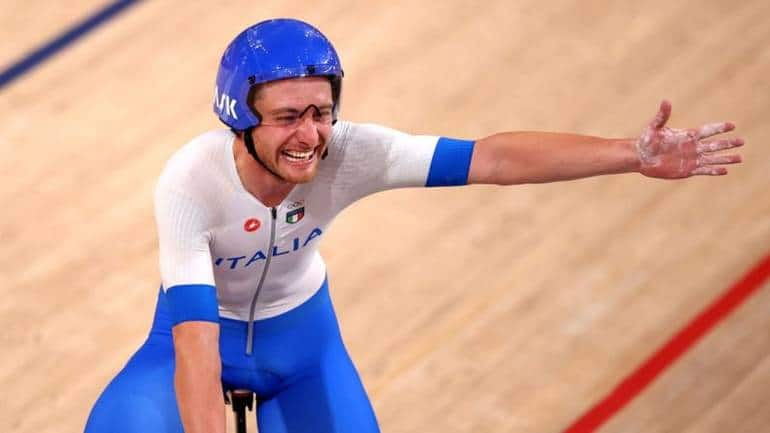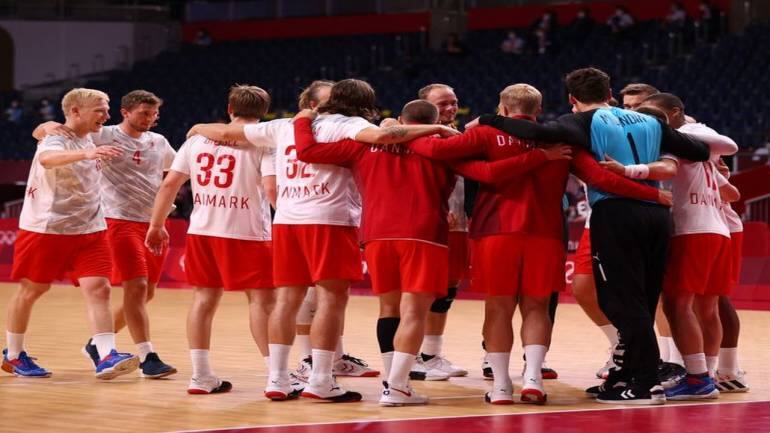Tokyo Olympics 2020 |Cycling: Golden Ganna powers Italy to victory in team pursuit thriller
 ]
]
Filippo Ganna inpired Italy to a long-awaited gold medal in the men’s team pursuit as they produced an electrifying finish to stun favourites Denmark in a see-sawing final at the Izu Velodrome on Wednesday.
The Azzurri trailed in the closing stages of the 16-lap duel but lead engine Ganna turned up the power and they blasted across the line in a world record 3:42.032, with the Danes an agonising 0.166 slower.
Italy’s quartet of Ganna, Simone Consonni, Francesco Lamon and Jonathan Milan, who had also set a world record on Tuesday, celebrated wildly, thumping their fists into their chests, after delivering their first gold in team pursuit since 1960.
The blue-clad Italian train led for the first half of the 16 laps around the 250-metre oval, but Denmark piled on the pressure to reel them in.
The Danes then turned the screws to open up what looked like a decisive lead, and with less than four laps remaining their foursome of Lasse Norman Hansen, Niklas Larsen, Frederick Madsen and Rasmus Pedersen had a buffer of almost a second.
But Italy were not done. Ganna lit the fuse, and the four began burning down the deficit. With a lap remaining Denmark still had gold in their sights but it slipped away in the final 100 metres as Italy claimed a record-extending eighth title - and their first in over 60 years.
“We knew we were fighting against a very good team. We knew we had to attack them in the last km and that’s what made the difference,” Ganna told reporters. “The plan went well and now we have the gold medal around our necks.”
It was quite a comeback by Ganna who missed out on a medal by two seconds in the 44km road time trial.
Team mate Lamon added: “This is a gift for all the group because it’s been five years we started working for this. We have a beautiful, beautiful team. Like a family.”
For the Danes it was a crushing blow having arrived in Tokyo as favourites to win the title for the first time since 1968.
“We’re incredibly disappointed right now. We’ve been training towards and hoping for gold for such a long time, so right now we are super disappointed,” Hansen said.
“We lost to a team that went a few hundredths faster than us. That is devastating, but we can be proud of silver.”
Australia won the ride-off for bronze after New Zealand suffered a crash. Britain, who had bossed the event since 2008 but were thrashed by the Danes in controversial circumstances on Tuesday, had to settle for seventh.
Denmark ripped up the team pursuit blueprint when they smashed the world record three times to win gold at the 2020 world championships in Berlin.
They arrived as the team to beat but became mired in controversy on Tuesday after protests from other teams, notably Britain, that they had used illegal taping on their shins to gain an advantage in Monday’s qualifying rounds.
They outclassed the defending champions Britain on Tuesday but that heat ended controversially when Frederick Madsen ploughed into the back of Charlie Tanfield, leading to more objections from the British.
Perhaps it took a toll on the Danes, but the Italians did not care as their anthem sounded around the arena.
The men’s sprint got under way on Wednesday flying Dutchmen Jeffrey Hoogland and Harrie Lavreysen living up to their favourites’ tag in the opening rounds.
Having combined to win gold in the team sprint the day before, they could not be separated as they set an identical time of 9.215 in the 200m flying start.
Both then eased through two more rounds to take their place among the last 12 who will go again on Thursday.
Reigning champion Jason Kenny, who settled for silver in the team sprint, was only eighth-fastest in the 200m flying start but made it safely through the day as did team mate Jack Carlin.
LinkedIn to allow most employees to work remotely, reversing course
 ]
]
Representative Image
LinkedIn will allow most employees to opt for full-time remote work as offices gradually reopen, Chief People Officer Teuila Hanson told Reuters.
This new policy from Microsoft Corp’s professional social networking site is a reversal of the company’s initial indication last October that employees would be expected to work from an office 50% of the time, when COVID-19 pandemic restrictions lift.
The updated policy, offering employees the flexibility to work remotely full-time or work at an office part-time, will apply to LinkedIn’s global workforce of more than 16,000 employees.
“We anticipate that we’ll definitely see more remote employees than what we saw prior to the pandemic,” Hanson said in a Wednesday interview ahead of the announcement, adding that some jobs would require in-office work.
Hanson said LinkedIn is not currently requiring employees to be vaccinated against COVID-19 to return to the office, in contrast to tech companies such as Facebook and Google that have responded to a rise in U.S. COVID-19 cases by requiring shots.
COVID-19 Vaccine Frequently Asked Questions View more How does a vaccine work? A vaccine works by mimicking a natural infection. A vaccine not only induces immune response to protect people from any future COVID-19 infection, but also helps quickly build herd immunity to put an end to the pandemic. Herd immunity occurs when a sufficient percentage of a population becomes immune to a disease, making the spread of disease from person to person unlikely. The good news is that SARS-CoV-2 virus has been fairly stable, which increases the viability of a vaccine. How many types of vaccines are there? There are broadly four types of vaccine — one, a vaccine based on the whole virus (this could be either inactivated, or an attenuated [weakened] virus vaccine); two, a non-replicating viral vector vaccine that uses a benign virus as vector that carries the antigen of SARS-CoV; three, nucleic-acid vaccines that have genetic material like DNA and RNA of antigens like spike protein given to a person, helping human cells decode genetic material and produce the vaccine; and four, protein subunit vaccine wherein the recombinant proteins of SARS-COV-2 along with an adjuvant (booster) is given as a vaccine. What does it take to develop a vaccine of this kind? Vaccine development is a long, complex process. Unlike drugs that are given to people with a diseased, vaccines are given to healthy people and also vulnerable sections such as children, pregnant women and the elderly. So rigorous tests are compulsory. History says that the fastest time it took to develop a vaccine is five years, but it usually takes double or sometimes triple that time. View more Show
LinkedIn employees who move locations could see their pay adjusted based on the local market where they’re based, said Greg Snapper, director of corporate communications.
The tech industry was among the first to allow employees to work from home when COVID-19 hit the U.S. last year. But the extent to which tech companies are embracing permanent remote work is now diverging.
LinkedIn’s openness to remote work stands in contrast to some Silicon Valley tech giants’ comparatively hard-line stances on returning to the office. Apple announced it will require most employees to work from the office three days per week starting in October, while Alphabet’s Google expects 60% of its global workforce to return to the office at least part-time.
LinkedIn is in the process of reopening its global offices based on COVID-19 infection rates in each location.
Tokyo Olympics 2020| Handball-Denmark overcome Egypt as European giants stay perfect
 ]
]
Olympic champions Denmark survived a scare before downing dark horses Egypt 32-27 at Tokyo’s Yoyogi National Stadium on Monday while European heavyweights France, Spain and Sweden also maintained their 100% records in the men’s competition.
Denmark had scraped past Egypt after a penalty shootout en route to their world title in January and faced early pressure when the African champions stormed to a 15-14 lead after 30 minutes.
The Danes were a different team after the break, tightening their defence and creating more openings for their attackers as they went ahead for the first time in the match before opening up a three-goal advantage at 26-23 and pulling away.
Mikkel Hansen scored nine goals and Mathias Gidsel had eight while goalkeeper Niklas Landin made 14 saves, including two with his head that left him needing medical attention, to help the favourites make it two wins from two matches in Group B.
“Egypt are one of the toughest opponents in the tournament, so it’s a good feeling to win… they play with a lot of power, but we were able to withstand that and respond when we needed to,” Denmark centre back Mads Mensah said.
Earlier, double Olympic champions France rang in the changes after their opening win over Argentina to outclass Brazil 34-29 and put themselves in a strong position to make the knockouts.
The top four teams out of six from each of the two groups will advance to the quarter-finals.
It was Brazil’s second loss in as many games and their woes were compounded in the dying seconds when left back Thiagus Petrus was dismissed for an elbow to the head of Nikola Karabatic.
“The good thing is we can rely on the whole squad so we can rotate players,” France coach Guillaume Gille said.
“The majority of the group have played a part today and it’s important to have that flexibility. There’s a lot of quality in the squad… they’re all capable of following the plan.”
Group A rivals Germany responded to their narrow defeat by Spain with a 33-25 win over Argentina, though Alfred Gislason’s side endured a nervy finish after captain Uwe Gensheimer’s red card in his 200th game.
Spain entered their clash with Norway having beaten them in their previous eight meetings but the European champions had to work hard for a 28-27 victory with a last-minute penalty.
Portugal also left it late to get past Bahrain 26-25 while Sweden stayed perfect with a 28-26 win over Japan.